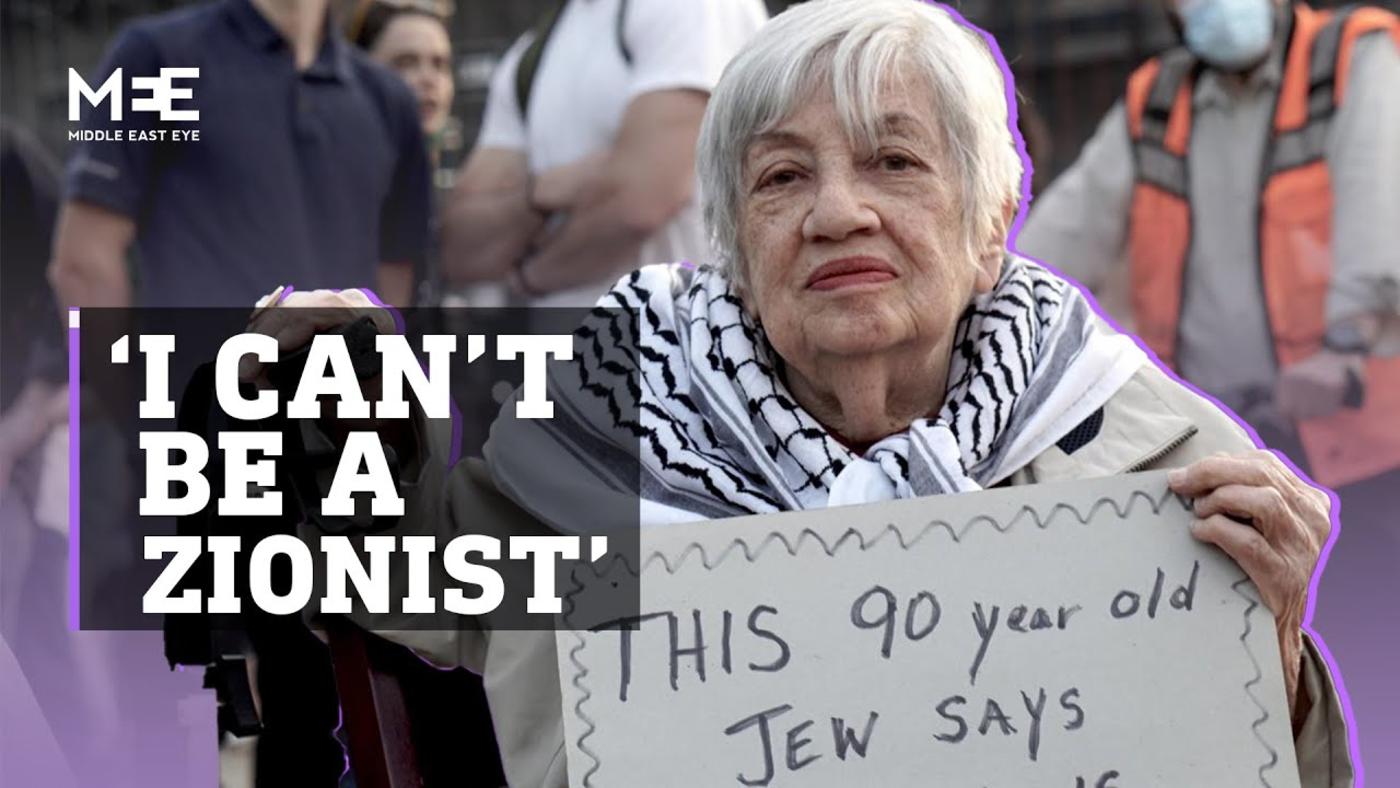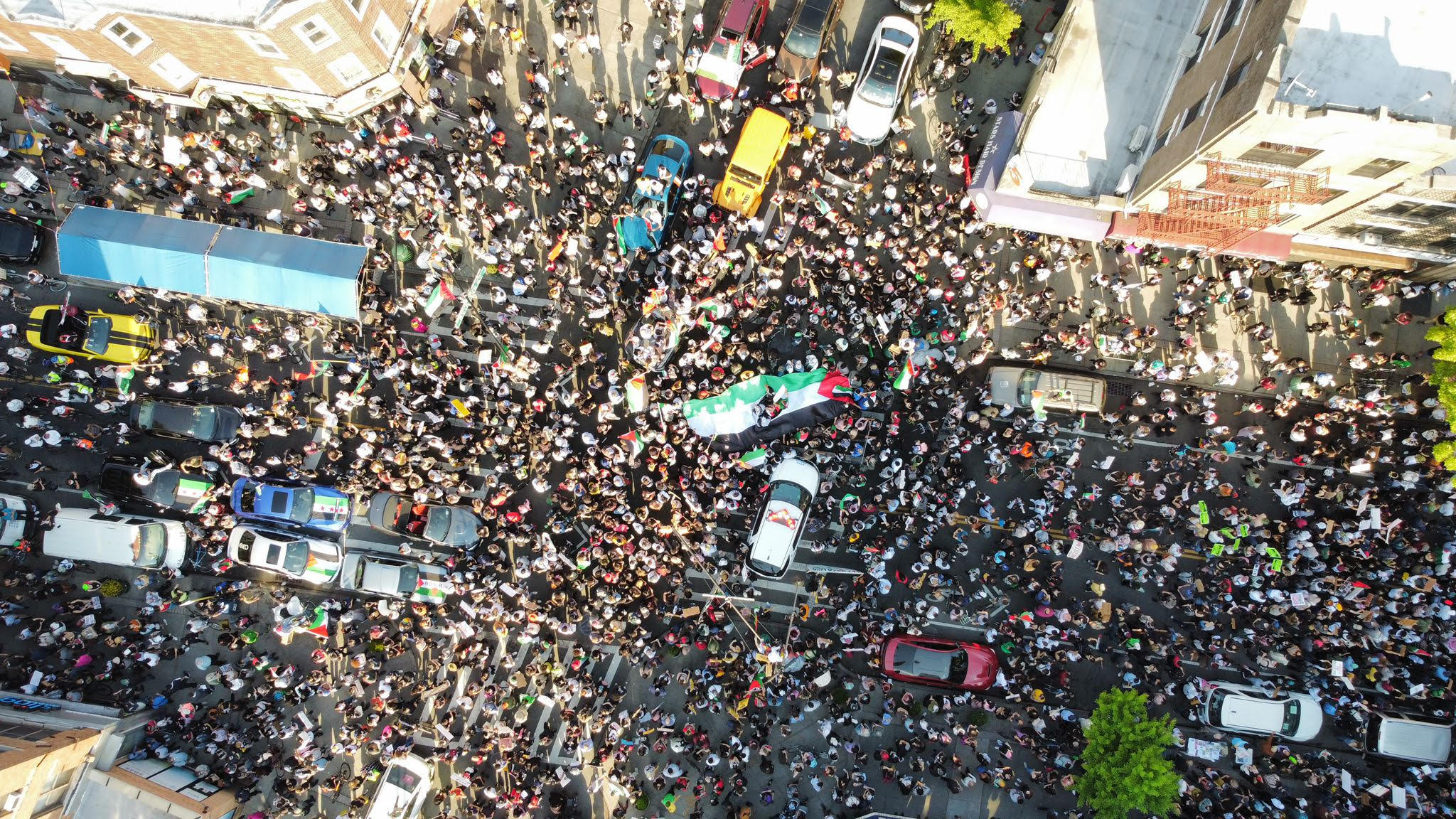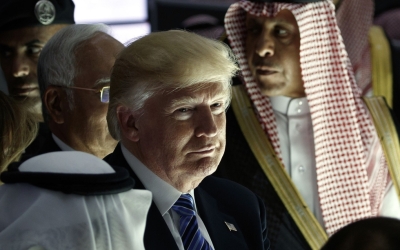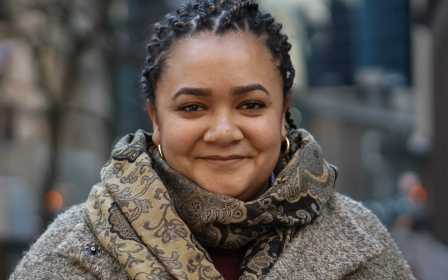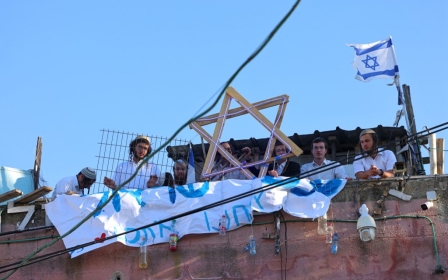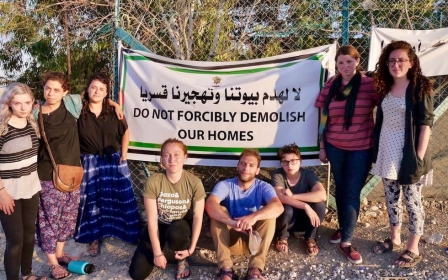Meet the 90-year old Jewish American woman protesting for Palestine
It is a cool Friday evening and Shatzi Weisberger is sitting on a plastic folding chair in Grand Army Plaza in Brooklyn minutes before the start of a Shabbat rally, called by Jewish New Yorkers in protest at the continued US support of Israel's occupation of Palestinians.
Around her hundreds of people make their way into the plaza; some with toddlers in tow, others lean and stretch on the paving, drawing slogans on to posters or arranging last-minute banners just as the event "Rise up Shabbat" is about to begin.
Weisberger is well prepared. With a Palestinian Keffiyeh loosely draped around her neck, she clutches on to her walker with her right hand, and with her left, holds a placard that reads: "This 90-year-old Jew says Zionism is genocide!"
'I am outraged at what the Zionists are doing. I am outraged at the media and their distortions'
- Shatzi Weisberger, Jewish American activist
The rally, one in a series of events organised by Jewish American groups in New York City, calls upon US President Joe Biden to stop funding and providing diplomatic cover for Israel. Like many others at the rally, Weisberger has much to say.
"I had to come here today," she tells Middle East Eye. "I am outraged at what the Zionists are doing. I am outraged at the media and their distortions."
A native of Brooklyn, Weisberger is disabled and suffers from macular degeneration. Like many other Jewish Americans in the city, she is no stranger to taking to the streets. A long time abolitionist and feminist, she has been attending civil rights protests in the United States for decades.
On her 90th birthday last year, she attended a Black Lives Matter (BLM) protest in the middle of the Covid-19 pandemic. Her steely zeal turned her into an overnight internet sensation. They dubbed her "the people's bubbie" (or grandma in Yiddish).
And with the forced displacements in Sheikh Jarrah, the attacks on worshippers at al-Aqsa Mosque and then the aerial bombardment of Gaza, Weisberger is back on the streets. This time, to protest against Zionism.
'Brainwashed'
Most observers agree the narrative has flipped in the US in recent weeks.
Despite the best efforts of many American media outlets to frame Israel's assault on Gaza as an act of self-defence, tens of thousands have come to multiple cities to demonstrate solidarity with Palestinians. Calls for to end aid to Israel continue to gather momentum and a critique of Israeli actions has reached the halls of US Congress.
Though much of the attention paid to attitudinal shifts in the Jewish American community has typically focused on Jewish Americans in their twenties and thirties, and their refusal to tow the Israeli line, Weisberger is part of a community of elders who have been chipping away at Zionism for years, especially when it wasn't especially socially acceptable to do so.
She describes transitioning to taking a position against Zionism as "a process that took time" given "the brainwashing" she had received as a child.
"It happened around 1983. Someone asked me to read a book. I don't remember the name but it had such an impact on me. I started questioning Zionism," Weisberger, who turns 91 on 17 June, said. "For some time I thought Israel could reform itself. But I don't believe that at all anymore. I realised that I can’t be a Zionist. No way. It is such an injustice, such cruelty, such distortion."
"I mean, the Holocaust was real. Antisemitism is real. But it doesn’t give Jews the right to then be the oppressor. It breaks my heart," she added.
Jewish identity in the US
Jewish Americans number around six million people. The community, 92 percent of whom are white, is considered diverse in political and religious outlook.
Despite the shifts over the past decade, Israel continues to play a dominant role in the make up of the Jewish American identity. In a recent Pew survey published in late May 2021, just 16 percent of American Jews surveyed said that caring about Israel was “not important” to their Jewish identity.
In contrast, 45 percent of American Jews described Israel as “essential” to what being Jewish means, while 37 percent say it is “important, but not essential." A further 32 percent of Jewish Americans said they believed that God gave the land that is now Israel to the Jewish people.
The survey, conducted in mid-2019 also concluded that younger American Jews were less attached to Israel. Around 66 percent of those older than 65 said they were very or somewhat attached to Israel, compared to 48 percent of those below the age of 30.
Whereas it is difficult to track the attitudinal shifts among older Jewish Americans, with most anecdotal data implying that younger Jews are both more critical of Israel as well as more likely to clash with elder members of their family or community on the issue, long time anti-Zionists aren't waiting for the boomer generation to change their mind.
"Zionism was racist from the start. I feel a life-long commitment to righting the wrong of settler-colonialism in Palestine. It was our responsibility 70 years ago," 78-year-old Rosalind Petchesky, a long time member of Jewish Voice for Peace (JVP) and an activist, told MEE.
"The recent Human Rights Watch report is important. The International Criminal Court saying it will investigate potential crimes against humanity is important. At least that is all out there. And it gives those of us, who have for much of our lives, fought as Jews against Zionist settler-colonialism and racism, some tools and weapons. It gives all of us the ability to form a collective movement."
"To see all of these Jews coming and standing for Palestine. I feel like I finally found my people," Petchesky said.
Protest and dissent
In attempting to understand the moment, activists and observers say that under former Donald Trump's presidency, the ambivalence many liberal Americans might have held regarding Israel's occupation and treatment of Palestinians helped turn their insipidness into all-out embarrassment as Israel, under Prime Minister Benjamin Netanyahu, became Trump's closest and unabashed ally.
During the Trump years, the US moved its embassy to Jerusalem, the Iran nuclear deal was shelved, and even the prospect of the full annexation of the occupied West Bank became plausible. He also facilitated a number of normalisation deals between Israel and the Gulf states of the United Arab Emirates and Bahrain, as well as with Sudan and Morocco.
But Trump's open racism, xenophobia, misogyny and courtship of white supremacy galvanised a defiant anti-racism movement in the US that culminated in the resurgence of the Black Lives Matter movement in 2020.
Norman Finkelstein, the Jewish-American political scientist, credits the BLM movement with forcing liberal Americans, including Jews, to rethink their approach to Israel. He describes the influence as "one of those strange concatenations of history."
"It heightened sensitive to white supremacy, white domination. Now comes along all these reputable mainstream human rights organisations - and they say that Israel is based on Jewish supremacy and Jewish domination - and what does that mean for the liberal community? They can't support that any more," Finkelstein, also the author of numerous books, including The Holocaust Industry, told MEE.
"So much has changed, he added.
Sumaya Awad, a Palestinian scholar and activist based in New York City, agrees.
"Seeing a growing movement of unabashedly anti-Zionist Jewish groups is an important and inspiring reminder that these groups are building on a long legacy of Jews who, long before Israel established itself as a settler-colonial state, rejected Zionism and rejected Israel’s ethnic cleansing project.
"Now as the mainstream once again tries to redirect the conversation away from Israel’s crimes against humanity as away from Palestinian suffering, by smearing the movement for Palestinian freedom as antisemitic, it’s especially important for Jewish groups to push back against the weaponisation of antisemitism and to cement the fact that Palestinian liberation is part of the struggle of the oppressed the world over," Awad told MEE.
Over the 11-day bombardment of Gaza, 248 Palestinians, including 66 children were killed. In the occupied West Bank and East Jerusalem, 29 Palestinians were killed by Israeli forces. Rockets fired from Gaza killed 12 Israelis, including three children. A tentative ceasefire holds. But Israeli violence on Palestinians hasn't ended, nor has the work for Jewish Americans ceased.
On Friday, Palestinian students and activists will gather outside the City University of New York (CUNY) to call for the university-wide divestment from Israel.
Shatzi Weisberger, along with a group of fellow Jewish Americans, will be there.
"It is certainly much easier to protest against Zionism than it was before. I am part of JVP and so I am no longer isolated in my anti-Zionism. I have this entire community whom I adore. So, yes, it easier today. Although I don't tend to focus on whether something is easy or not. I believe I should do it whether it is hard or not," Weisberger said.
"I never thought I'd say this: I am glad I am 90 because me being there brings attention to the issues that matter. And I will be doing as many demonstrations as I possibly can."
Middle East Eye propose une couverture et une analyse indépendantes et incomparables du Moyen-Orient, de l’Afrique du Nord et d’autres régions du monde. Pour en savoir plus sur la reprise de ce contenu et les frais qui s’appliquent, veuillez remplir ce formulaire [en anglais]. Pour en savoir plus sur MEE, cliquez ici [en anglais].


